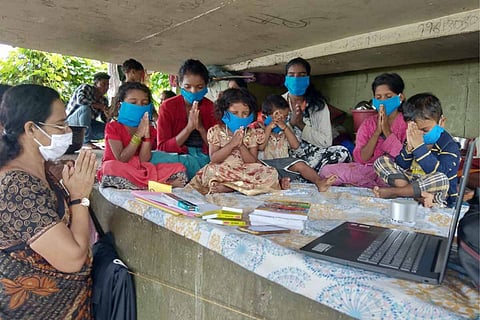

A small group of children, wearing masks, are huddled together. In front of them are open textbooks and a laptop. A teacher holds up a chart paper, as the children, who seem to be sitting on a small ledge, listen on. A toddler curiously looks on. This is a small classroom in Kerala — the only difference is, these classes are taking place under a bridge.
If not for a school’s novel initiative, a group of homeless migrant students would have nothing else to do but go fishing with their parents, even as their peers sat in front of laptops, televisions and smartphones, attending the virtual classes started by the Kerala government.
The seven students belong to nomadic fishing families, who hail from Mysuru. They live under Vallarpadam Bridge on the outskirts of Kochi. Despite the fact they do not have a proper roof over their heads, they are able to attend the virtual classes, thanks to the school officials of St John Bosco’s Upper Primary School in Kochi.
When the state government announced the launch of virtual classes via the ‘First Bell’ programme on June 1, officials of this government-aided school, located near the Kerala High Court, made sure that these seven students who did not have a house did not remain excluded.
“At least three teachers have been going to the Vallarpadam Bridge since June 2. The teachers download the previous day’s virtual classes on laptops and play them for the students. Every day, for over an hour, the teachers sit with the students and make sure they understand the lessons,” Elizabeth Fernandez, the principal of the school tells TNM.
While some of the students have been studying at the school for the past two years, some had joined the school a year ago.
“The children had come with their families from Mysuru for fishing. It was after a lot of effort and a lot of convincing, that the families started to send the children to school in the first place. We did not want that to be disrupted, and so we made sure they get access to the virtual classes this year,” says Elizabeth.
In addition to making the students watch the virtual classes, the teachers go a step further to make sure that the students understand what is being taught. They bring charts, colouring aids, and even play rhymes for the students so that they remain interested in the lessons.
“Though only seven children from the families had been attending the school, when we go there, there are other small kids too. The parents are usually out fishing and the kids are alone there. So while one teacher teaches one section, other teachers help to keep the others engaged as well,” says Neema, one of the teachers who visits the bridge.
She also adds that there were times when the students had already left with their parents for fishing before the teachers could reach there. But that has not stopped the spirit of the teachers or the school officials from continuing what they do.
However, now that the monsoon has arrived, the teachers are hoping to get some help from the state as well.
“During rainy days, it is often difficult to carry out the classes. Water gets collected under the bridge. We have asked the local body officials to find a place for the students so that they can attend the classes safely,” says Principal Elizabeth.
Watch: